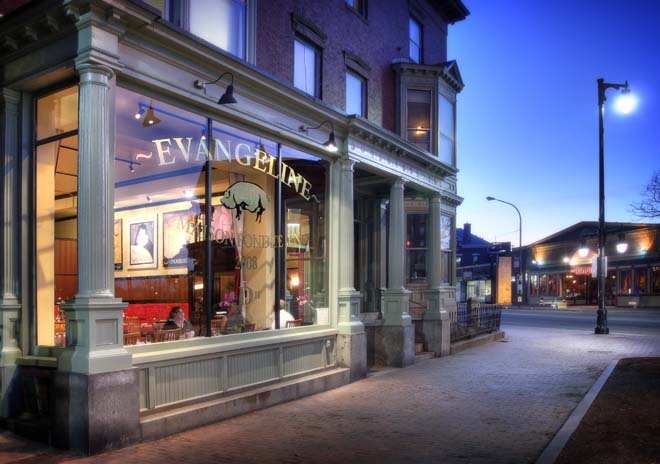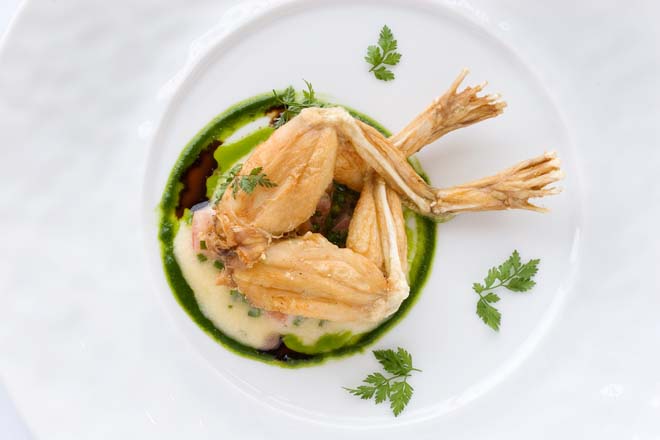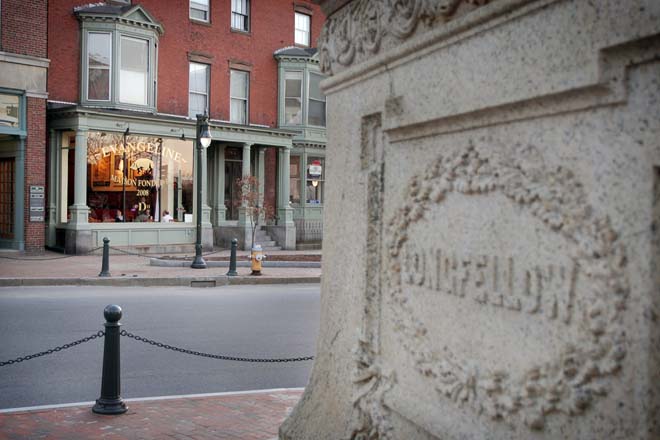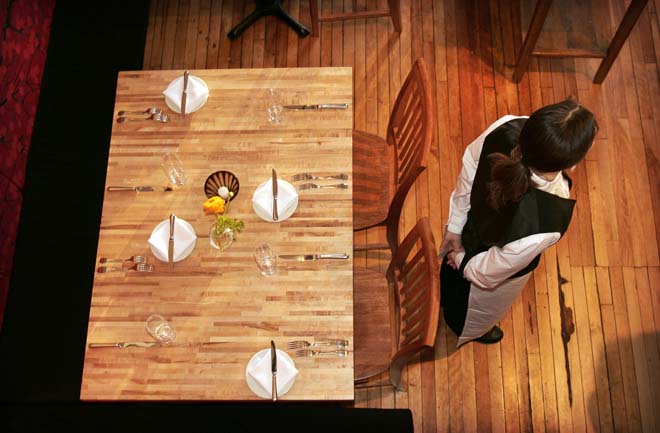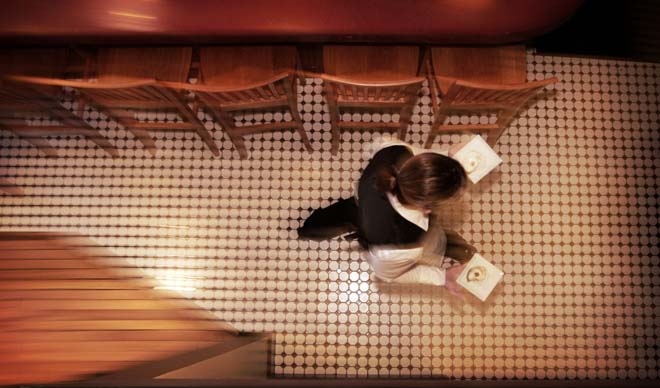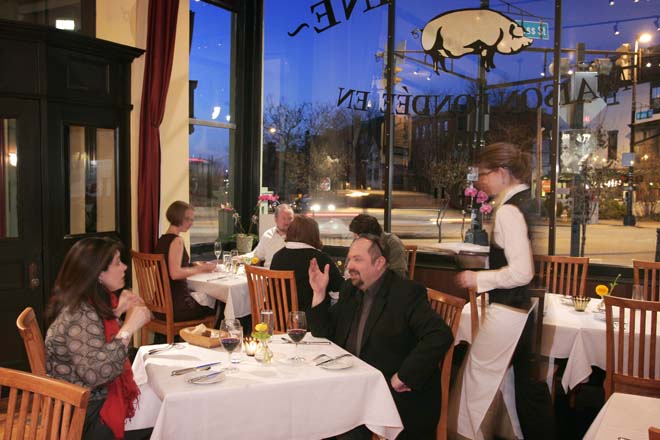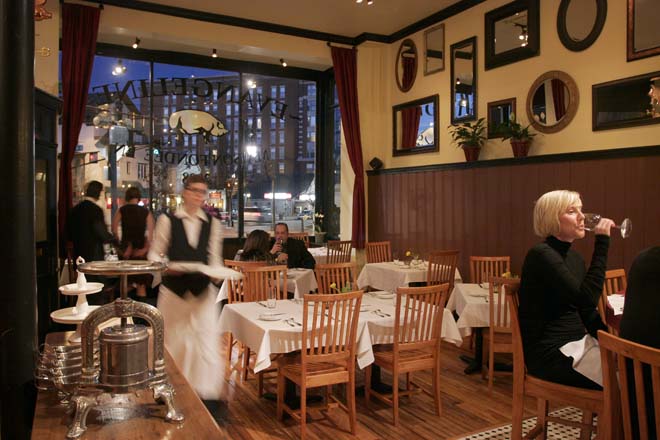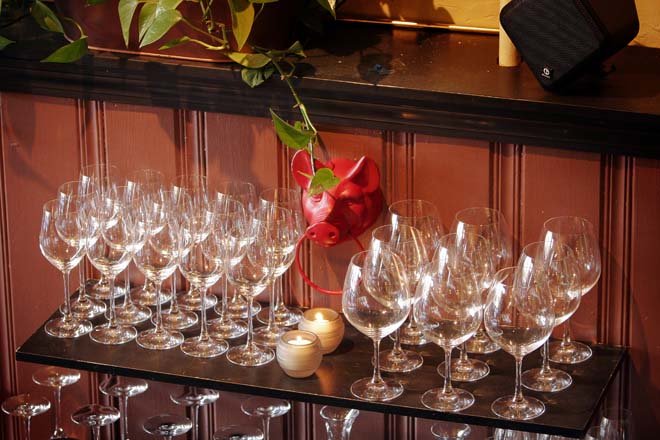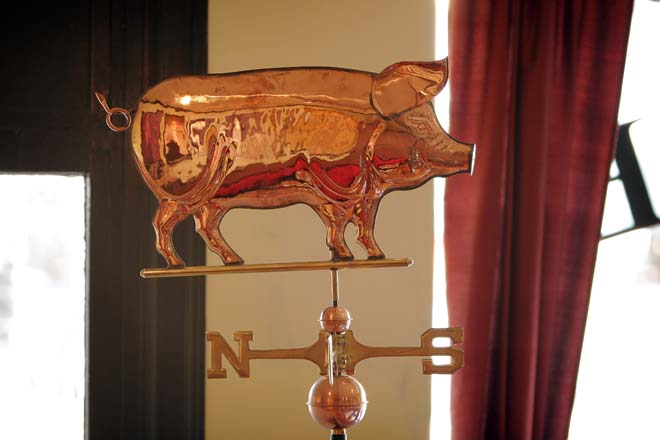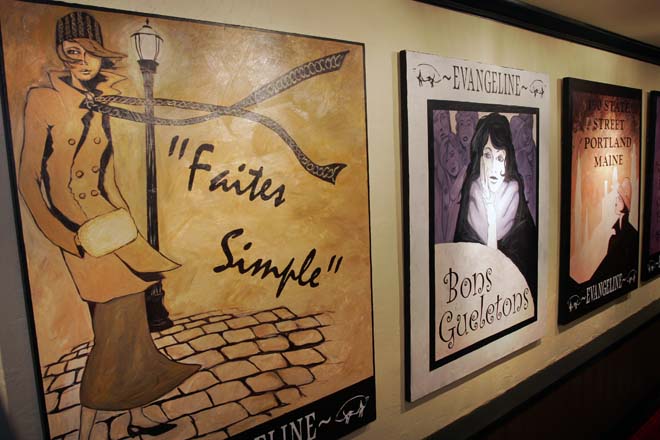A Family’s Fair
FEAST-July 2008 (from Maine Home+Design)
by Joshua Bodwell
Photography Irvin Serrano
Maine is peppered with poetically named towns—from Union and Liberty to Old Town and Oxbow. When a friend offered John and Beth Hikade the use of a dilapidated circa-1790 Federal-style home in Sedgwick some thirty-five years ago, John didn’t know what to make of the town’s name. “But I flipped the map open,” he recalls, “and I saw that right next door was a town called Blue Hill…I liked the sound of that immediately!”
Young and working in restaurants on Martha’s Vineyard at the time, the Hikades leapt and resettled on the then-sleepy Maine peninsula. It was 1973. Within six years—after some heavy-duty restoration of the creaky Federal they were living in, and a little dabbling in furniture restoration—the Hikades returned to what they knew best: food. Since 2000, John and Beth, with the help of their grown sons, Andrew and Timothy, have been running their latest dining destination, Arborvine.
Housed in a lovingly restored circa-1823 Cape, Arborvine is a mix of small, private rooms and a larger, open dining room in an L-shaped space that originally attached the home to the barn. The traditional post-and-beam construction is exposed, showing some hand-hewn beams and some that are rough sawn. The tables are bedecked with antique linens and surrounded by Windsor chairs that sit atop rippling, wide-pine floors. Here and there, the trim is painted milky shades of blue or green. The occasional hand-carved, half-hull ship model adorns a wall—a few are by Steven White, the son of famed boatbuilder Joel White and the grandson of E.B. White.
Arborvine’s spare yet elegant dining room, overseen by Beth, is the ideal setting for John’s delicately balanced menus, which are neither stringently traditional nor ostentatiously contemporary. His culinary approach is based on a long-held philosophy: “I have always tried to get the freshest, best local food I can,” says John, “and to prepare it in interesting but uncluttered ways…in ways that make the strengths of each individual ingredient reinforce one another.”
When they purchased the Cape on the edge of Blue Hill’s idyllic Main Street, it had been empty for ten years, and to say that it had fallen into disrepair would be an understatement. “It was such a wreck,” remembers Beth, “that you could see daylight through the walls in several different rooms!” The Hikades, however, were no strangers to restoration. In 1979, they renovated a former blacksmith’s forge in the center of town and opened Firepond, a restaurant that, in the minds of many, marked the start of fine dining on the peninsula.
Arborvine turned out to be a much greater challenge. Purchased in 1998, it took two years of hard work before they could open the doors. The house’s long, skinny ell was collapsing, and John rebuilt it himself using traditional post-and-beam methods. The attached barn was unsalvageable and was replaced with a structure of similar proportions that, today, houses the kitchen. The “barn” was eventually expanded and, in 2003, became Arborvine’s sister bistro, the Vinery; the youngest Hikade, 24-year-old Andrew, is the eatery’s chef.
“Our challenge was to maintain the historic 1823 elements,” says John, “but to also create a comfortable, up-to-date restaurant.”
“It was really a labor of love,” says Beth, who still remembers carefully disassembling the rotted windows to save the panes of hand-blown glass, which were reused in new, custom-built windows.
Today, Arborvine’s interior feels meticulously restored but also understated and comfortable. Outside, the grounds are impeccable but unfussy: English-style flower gardens in the front and herb gardens in the back that give way to trellised grape vines and a small orchard of cherry, peach, and plum trees. This close attention to nature is not surprising given John Hikade’s gastronomic ideals: “Organic and local is the way people are going now,” he says admiringly. “We’ve been doing that for thirty years now—and not because it’s in vogue, but because it tastes the best!”
During the high season, organic greens and produce arrive at Arborvine from four nearby farms. Organic, free-range meats come from no less than seven different purveyors; seafood from another four. The oysters served at Arborvine are from the Bagaduce River Oyster Company, located right around the corner, and are often harvested just hours before they land on the dinner table. The smoked salmon, trout, and mussels are prepared up the road by a Scottish friend of the Hikades.
These days, John is aided in the kitchen by a capable and familiar sous chef: 26-year-old Timothy Hikade. “I can still remember Tim in the kitchen at Firepond, maybe 6 or 7 years old,” says John, “peeling shrimp and breaking the tops off sugar snap peas…he had to stand on a wooden crate!” Today, Tim is well over six feet tall.
Arborvine’s menu, which changes every few months, is a more mature evolution of the cuisine John prepared at Firepond. “I hate food labels,” he admits before adding, “but I love classical French cooking and classical Italian and oriental, though what I love most is the freedom American chefs have to combine all the world cuisines. That’s what you find at Arborvine.” The season’s bounty’s remains John’s strongest influence. When he realized the first big catch of halibut would arrive over Memorial Day weekend, he paired the fish with another spring delight: ramps (wild baby leeks). The spring menu also includes a salad of baby beets and pears topped with scallions, gorgonzola, and lemon vinaigrette, and a roasted and seared trio of duck with a honey-thyme glaze and mango-pineapple salsa. “You have to care and you have to have passion,” says John. “There is no replacement.” Passion is a word John uses frequently when discussing food.
Although the couple has built a dedicated clientele over the years, Arborvine—the marriage of John’s prowess in the kitchen and Beth’s front-of-house skills—continues to win new devotees. John still remembers a night at Firepond many years ago when he realized the restaurant was attracting patrons from the most far-flung corners of the region and beyond.
One regular, local customer approached John after her meal and admitted, “I don’t recognize a single person in the restaurant tonight!” This customer was not only the kind of connoisseur who knew James Beard personally and occasionally hosted him for meals at her Blue Hill home, but she also prided herself on knowing everybody in town.
“It made me realize how broadly we’d reached,” John recalls with a smile. “It was so revealing…so wonderful…”

